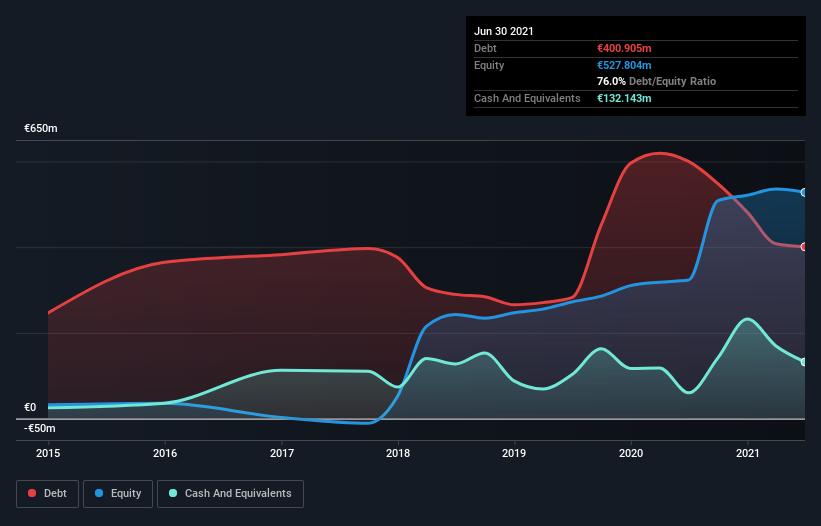
Some say volatility, rather than debt, is the best way to think about risk as an investor, but Warren Buffett famously said that 'Volatility is far from synonymous with risk.' It's only natural to consider a company's balance sheet when you examine how risky it is, since debt is often involved when a business collapses. We note that Instone Real Estate Group SE (ETR:INS) does have debt on its balance sheet. But should shareholders be worried about its use of debt?
When Is Debt Dangerous?
Debt is a tool to help businesses grow, but if a business is incapable of paying off its lenders, then it exists at their mercy. In the worst case scenario, a company can go bankrupt if it cannot pay its creditors. However, a more usual (but still expensive) situation is where a company must dilute shareholders at a cheap share price simply to get debt under control. Having said that, the most common situation is where a company manages its debt reasonably well - and to its own advantage. The first thing to do when considering how much debt a business uses is to look at its cash and debt together.
See our latest analysis for Instone Real Estate Group
How Much Debt Does Instone Real Estate Group Carry?
The image below, which you can click on for greater detail, shows that Instone Real Estate Group had debt of €400.9m at the end of June 2021, a reduction from €600.0m over a year. However, because it has a cash reserve of €132.1m, its net debt is less, at about €268.8m.

A Look At Instone Real Estate Group's Liabilities
We can see from the most recent balance sheet that Instone Real Estate Group had liabilities of €514.0m falling due within a year, and liabilities of €337.9m due beyond that. Offsetting these obligations, it had cash of €132.1m as well as receivables valued at €362.8m due within 12 months. So its liabilities outweigh the sum of its cash and (near-term) receivables by €356.9m.
Instone Real Estate Group has a market capitalization of €1.14b, so it could very likely raise cash to ameliorate its balance sheet, if the need arose. However, it is still worthwhile taking a close look at its ability to pay off debt.
In order to size up a company's debt relative to its earnings, we calculate its net debt divided by its earnings before interest, tax, depreciation, and amortization (EBITDA) and its earnings before interest and tax (EBIT) divided by its interest expense (its interest cover). Thus we consider debt relative to earnings both with and without depreciation and amortization expenses.
Instone Real Estate Group has a debt to EBITDA ratio of 3.1 and its EBIT covered its interest expense 3.8 times. This suggests that while the debt levels are significant, we'd stop short of calling them problematic. Even more troubling is the fact that Instone Real Estate Group actually let its EBIT decrease by 4.1% over the last year. If that earnings trend continues the company will face an uphill battle to pay off its debt. The balance sheet is clearly the area to focus on when you are analysing debt. But ultimately the future profitability of the business will decide if Instone Real Estate Group can strengthen its balance sheet over time. So if you want to see what the professionals think, you might find this free report on analyst profit forecasts to be interesting.
Finally, a business needs free cash flow to pay off debt; accounting profits just don't cut it. So the logical step is to look at the proportion of that EBIT that is matched by actual free cash flow. Over the last three years, Instone Real Estate Group reported free cash flow worth 17% of its EBIT, which is really quite low. For us, cash conversion that low sparks a little paranoia about is ability to extinguish debt.
Our View
Both Instone Real Estate Group's conversion of EBIT to free cash flow and its interest cover were discouraging. At least its level of total liabilities gives us reason to be optimistic. Taking the abovementioned factors together we do think Instone Real Estate Group's debt poses some risks to the business. While that debt can boost returns, we think the company has enough leverage now. When analysing debt levels, the balance sheet is the obvious place to start. But ultimately, every company can contain risks that exist outside of the balance sheet. Be aware that Instone Real Estate Group is showing 3 warning signs in our investment analysis , you should know about...
At the end of the day, it's often better to focus on companies that are free from net debt. You can access our special list of such companies (all with a track record of profit growth). It's free.
New: AI Stock Screener & Alerts
Our new AI Stock Screener scans the market every day to uncover opportunities.
• Dividend Powerhouses (3%+ Yield)
• Undervalued Small Caps with Insider Buying
• High growth Tech and AI Companies
Or build your own from over 50 metrics.
This article by Simply Wall St is general in nature. We provide commentary based on historical data and analyst forecasts only using an unbiased methodology and our articles are not intended to be financial advice. It does not constitute a recommendation to buy or sell any stock, and does not take account of your objectives, or your financial situation. We aim to bring you long-term focused analysis driven by fundamental data. Note that our analysis may not factor in the latest price-sensitive company announcements or qualitative material. Simply Wall St has no position in any stocks mentioned.
Have feedback on this article? Concerned about the content? Get in touch with us directly. Alternatively, email editorial-team (at) simplywallst.com.
About XTRA:INS
Instone Real Estate Group
Develops residential real estate properties in Germany.
Excellent balance sheet with proven track record.
Similar Companies
Market Insights
Community Narratives



